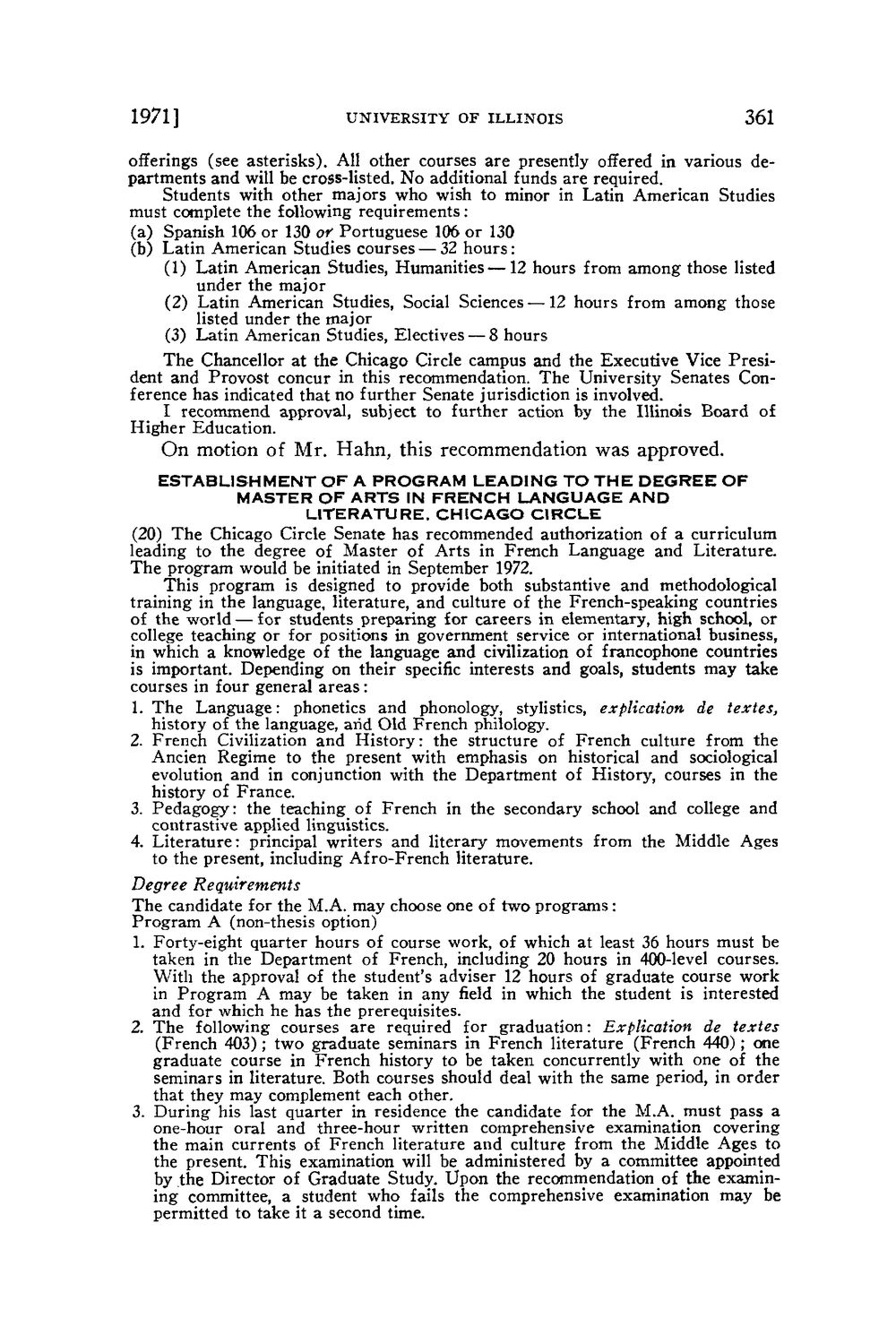| |
| |
Caption: Board of Trustees Minutes - 1972
This is a reduced-resolution page image for fast online browsing.

EXTRACTED TEXT FROM PAGE:
1971] UNIVERSITY OF ILLINOIS 361 offerings (see asterisks). All other courses are presently offered in various departments and will be cross-listed. No additional funds are required. Students with other majors who wish to minor in Latin American Studies must complete the following requirements: (a) Spanish 106 or 130 of Portuguese 106 or 130 (b) Latin American Studies courses — 32 h o u r s : (1) Latin American Studies, Humanities — 1 2 hours from among those listed under the major (2) Latin American Studies, Social Sciences-—12 hours from among those listed under the major (3) Latin American Studies, Electives — 8 hours The Chancellor at the Chicago Circle campus and the Executive Vice President and Provost concur in this recommendation. The University Senates Conference has indicated that no further Senate jurisdiction is involved. I recommend approval, subject to further action by the Illinois Board of Higher Education. O n m o t i o n of M r . H a h n , t h i s r e c o m m e n d a t i o n w a s a p p r o v e d . ESTABLISHMENT O F A PROGRAM LEADING TO T H E DEGREE OF MASTER OF ARTS IN FRENCH LANGUAGE AND LITERATURE. CHICAGO CIRCLE (20) The Chicago Circle Senate has recommended authorization of a curriculum leading to the degree of Master of Arts in French Language and Literature. T h e program would be initiated in September 1972. This program is designed to provide both substantive and methodological training in the language, literature, and culture of the French-speaking countries of the world — for students preparing for careers in elementary, high school, or college teaching or for positions in government service or international business, in which a knowledge of the language and civilization of francophone countries is important. Depending on their specific interests and goals, students may take courses in four general a r e a s : 1. The Language: phonetics and phonology, stylistics, explication de textes, history of the language, arid Old French philology. 2. French Civilization and H i s t o r y : the structure of French culture from the Ancien Regime to the present with emphasis on historical and sociological evolution and in conjunction with the Department of History, courses in the history of France. 3. Pedagogy: the teaching of French in the secondary school and college and contrastive applied linguistics. 4. Literature: principal writers and literary movements from the Middle Ages to the present, including Afro-French literature. Degree Requirements T h e candidate for the M.A. may choose one of two programs: Program A (non-thesis option) 1. Forty-eight quarter hours of course work, of which at least 36 hours must be taken in the Department of French, including 20 hours in 400-level courses. With the approval of the student's adviser 12 hours of graduate course work in Program A may be taken in any field in which the student is interested and for which he has the prerequisites. 2. The following courses are required for graduation: Explication de textes (French 403); two graduate seminars in French literature (French 440); one graduate course in French history to be taken concurrently with one of the seminars in literature. Both courses should deal with the same period, in order that they may complement each other. 3. During his last quarter in residence the candidate for the M.A. must pass a one-hour oral and three-hour written comprehensive examination covering the main currents of French literature and culture from the Middle Ages to the present. This examination will be administered by a committee appointed by the Director of Graduate Study. Upon the recommendation of the examining committee, a student who fails the comprehensive examination may be permitted to take it a second time.
| |